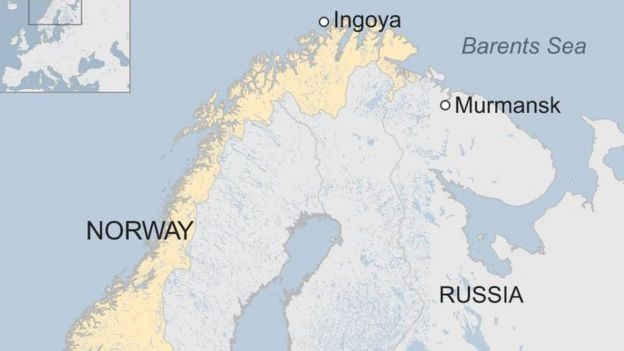The Spy That Came In From The Cold Sea
"This is a tame animal that is used to get food served so that is why it has made contacts with the fishermen."
"The question is now whether it can survive by finding food by itself. We have seen cases where other whales that have been in Russian captivity [are] doing fine."
"It is most likely that [the] Russian Navy in Murmansk [is involved. Russia has major military facilities in and around Murmansk on the Kola Peninsula, in the far northwest of Russia]."
Audun Rikardsen, professor, Department of Arctic and Marine Biology, Arctic University of Norway, Tromsoe
"If this comes from Russia, and there is good reason to believe it does, then it is not Russian scientists but rather the navy that has done this."
"This is not a method scientists use, and as far as I know, Russian scientists do not tag beluga whales."
Martin Biuw, Institute of Marine Research, Norway
 |
| Joergen Ree Wiig tries to reach the harness attached to a beluga whale before the Norwegian fishermen were able to removed the tight harness, off the northern Norwegian coast Friday, April 26, 2019. The harness strap which features a mount for an action camera, says "Equipment St. Petersburg" which has prompted speculation that the animal may have escaped from a Russian military facility. (Joergen Ree Wiig/Norwegian Direcorate of Fisheries Sea Surveillance Unit via AP) |
With the melting of Arctic glaciers and sea ice becoming less packed in, sea lanes are opening up, promising greater accessibility to shorten voyages through the Northwest Passage, reducing costs for trade purposes. Even China, as distant as it is from the Arctic has requested observer status on the future of the Arctic within UN auspices. Fishermen in northern Norway were startled recently when a beluga whale came abreast of their fishing boat. The cetacean appeared to seek them out as though it wanted something.
Perhaps, as a 'tame' animal accustomed to being fed, that might be what it wanted. On the other hand, a constricting harness was attached to the small whale and it's even more likely it wanted help removing the harness. Fishing off the island of Ingoya in proximity to Norway's Arctic border with Russia three brothers saw the small white whale alongside their boat. It had previously approached other fishemen who witnessed the beluga attempting to rub the straps off its body, the brothers said.
Eventually the whale was relieved of the irritating harness when a fisheries service employee wearing a wetsuit was enabled to remove the harness while in the water, and the beluga swam away, communication received, aid given. On the buckle of the harness identification as to its origins was clear: "Equipment St.Petersburg" was stamped there. And with the harness was an attachment meant to hold a GoPro camera.
Professor Rikardsen from the Norwegian Arctic University contacted Russian colleagues to ascertain that neither they nor Norwegian scientists had placed the harness on the whale. During the Cold war in the time of the Soviet Union a program with "combat dolphins" had been undertaken. Dolphins trained to hunt for submarines and mines. Former army media officer Viktor Baranets spoke of the dolphins completing tasks "from studying the sea floor to guarding harbours to destroying enemy infiltrators to attaching explosives to the hulls of foreign ships".
This, in reference to a secret military installation in Cossack Bay, Crimea, known to train belugas and dolphins. With the collapse of the Soviet Union, two dolphinariums at Cossack Bay fell into disuse, wth one trainer taking possession of a beluga whale and other animals in 2000, taking them to Iran insisting that in Ukraine he was left with nothing to feed them. When Moscow annexed Crimea in 2014 when eastern Ukraine fell to rebel ethnic-Russian Ukrainians opting for independence, it took possession of the facility.
Since then the program evidently was expanded. The Russian defence ministry in 2016 announced a tender for the purchase of five dolphins. A now-retired Russian general attributed "Scandinavian paranoia" to the very thought that the whale had been engaged in a spying operation for Russia. "The Norwegians probably would have liked the ID of a GRU dolphin officer to be attached to it as well. We're not idiots. If we were conducting reconnaissance with the help of this animal, how would we have done it? Written a mobile phone number on it to call in case something happens?"
Well -- who knows?!

Labels: Beluga Whale, Norway, Russia, Spyware

<< Home